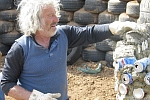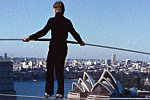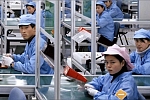 Shadows off the beaten path
Shadows off the beaten pathGARBAGE WARRIOR | MAN ON WIRE | MANUFACTURED LANDSCAPES
< < D O C S > >
last update 17.Jun.08
See also: SHADOWS FILM FESTIVAL
 R E V I E W B Y R I C H C L I N E
R E V I E W B Y R I C H C L I N E
with Chris Waitt, Hilary Waitt, Vicky, Julia, Dawn, Danielle, Za, Olivia, Janet, Charlie, Alex, Mistress Maisie, Adrian Stoddart, Danny Bayne, Lulu Preston, Patrick Sheehan, Kavida Rei

release US Jan.08 sff;
UK 27.Jun.08
08/UK Film4 1h29
SUNDANCE FILM FEST

 With a willingness to make himself look like a complete loser, filmmaker Waitt creates a hilariously entertaining mock-documentary that strangely blurs fact and fiction.
With a willingness to make himself look like a complete loser, filmmaker Waitt creates a hilariously entertaining mock-documentary that strangely blurs fact and fiction.
To understand why all of his relationships have ended so badly, Waitt decides to talk to his ex-girlfriends. Maybe he can learn something that will help him have some success in the future. Along the way, he discovers that his mother Hilary is perhaps the only woman he knows who's still willing to talk to him, and with her help he gets in touch with a few of his exes, all of whom reveal what a terrible boyfriend he was.
This isn't much of a surprise, since he's such a ramshackle mess--unmotivated, slobby, self-obsessed, mopey. But it's rather fun to watch his self-inflicted humiliation on screen, especially since he's so willing to push things far beyond the boundaries of polite conversation. Yes, it's amusing and often very silly, but it's also frank and rude. Doors are slammed in his face and one angry ex only agrees to appear in the film if she's off-screen and speaking through a computer. His rose-coloured memories are revealed to be warped and one-sided ("I was naive and romantic; you were a jerk"). And most people he meets quickly lose patience with his filmmaking project ("You're just ambling around freaking people out").
And it gets even darker as Wiatt delves into his sexual deficiencies through hypnotherapy, a comedy fitness interlude, acupuncture, massage, impotence counselling (including a far-fetched Viagra farce) and even a visit to a dominatrix. Yes, he exposes all of his shortcomings on screen, appearing literally naked in all his scruffy, clueless glory. And while this sharp, self-critical approach is often extremely amusing, many of the scenes feel constructed for maximum effect.
This is apparent especially in his specific persona: unshaven, rumpled, dazed, always wearing headphones around his neck. None of this is accidental; Waitt is playing a character, and when we remember that, it's both funny and intruging, especially when he raises serious issues about self-delusion and the difficulty of connecting with other people. It's a cleverly made film. Just don't believe it for a second.
10.Mar.08
 R E V I E W B Y R I C H C L I N E
R E V I E W B Y R I C H C L I N E
with Michael Reynolds, Renni Zifferblatt, Shauna Malloy, Dave Dicicco, Leonard Lee Rawson, Roy Gardener, Gary Carlson, Nileshe Gupte, Seth, Damien, Phil, Ted, Kan, Kirsten, Rory, Chris
 release US Jun.07 Silverdocs,
release US Jun.07 Silverdocs, UK 23.May.08
07/UK 1h26
 By telling an astonishing story in a straightforward narrative style, British filmmaker Hodge turns the people into terrific movie characters and inventively highlights the serious issues at hand.
By telling an astonishing story in a straightforward narrative style, British filmmaker Hodge turns the people into terrific movie characters and inventively highlights the serious issues at hand.
In Taos, New Mexico, architect Michael Reynolds has dedicated his life to "radically sustained living", building experimental, self-sufficient houses that are completely off the grid. When he started in the 1960s, it seemed like a hippie commune, especially since the residents tended to be over-eager drop-outs (one of them calls Reynolds a "freak magnet"). But tight communities develop, and Reynolds finds himself at odds with authorities for violating construction and zoning codes. So he takes on the system to prove that what he's doing has solid benefits for society. And the world.
Avoiding preachy messages and flashy filmmaking gimmicks, Hodge uses simple chronology and vivid personalities to pull us into the story and get the message across. Reynolds is a lively character who seems completely nuts with his uncontrollable hair and wacky ideas like using beer bottles and old tyres to build houses that rely on the sun for energy and warmth and get their water from the rain and wells. Yet as it progresses, we see his true genius.
We also start to see the hope his innovations can offer, strikingly demonstrated when he travels with his team to help build homes for displaced people in the Andaman Islands after the 2004 tsunami and in Mexico after hurricane Rita. This puts his legal battle into significant perspective, and adds a subtly potent comment on government attitudes to global warming and dwindling oil reserves. Not to mention the terrifying reach of big business.
As the story unfolds, we are constantly intrigued by the raw facts, plus the idea of living in a house that's almost alive around you, recycling heat and water in such a way that you'd never pay for another utility or mortgage. This is a challenging comment on how much the rest of us waste on a daily basis (they re-use literally everything). The fact that this breaks rules isn't actually very surprising. And in this way, Hodge cleverly conveys how far we've gone wrong in electing leaders who crush dreams, innovation and risk.
17.Apr.08
 R E V I E W B Y R I C H C L I N E
R E V I E W B Y R I C H C L I N E
with Philippe Petit, Jean-Louis Blondeau, Jean-Fran¨ois Heckel, Annie Allix, David Foreman, Alan Welner, Barry Greenhouse, Mark Lewis, Jim Moore, Guy Tozzoli, Paul McGill, Ardis Campbell
 release US 25.Jul.08,
release US 25.Jul.08, UK 1.Aug.08
08/UK BBC 1h30
SUNDANCE FILM FEST

 Cleverly assembled like a heist thriller, this film documents the 1974 wire-walking stunt between the twin towers of the World Trade Center. Not only does it have a remarkable resonance seven years after 9/11, but it's a cracking good story.
Cleverly assembled like a heist thriller, this film documents the 1974 wire-walking stunt between the twin towers of the World Trade Center. Not only does it have a remarkable resonance seven years after 9/11, but it's a cracking good story.
Philippe Petit (played by McGill in reconstructions) is a cheeky street performer who became obsessed with walking a tightrope between the twin towers when he saw a conceptual drawing of the buildings at age 17. Five years later, he was in New York walking back and forth between the towers, 450 meters above the ground for 45 minutes. The film retraces the road to this event with a rag-tag group of cohorts, by way of similar wire-walking adventures at Notre Dame in Paris and the Sydney Harbour Bridge.
Filmmaker Marsh tells the story through a spicy assembly of new interviews, archive footage and stills, and artful dramatisations. As it progresses, Marsh also captures a fascinating sense of the period, including the fact that this kind of outrageous stunt would be nearly impossible to accomplish amid today's heightened security measures. He also pointedly sets the event in context: this happened two days before Richard Nixon resigned as US President.
Along the way, we also get the history of the towers themselves, with footage from the groundbreaking to the topping-out ceremony, all observed with great interest by Petit. And each person in the story emerges as a real character on their own, from the mischievous Petit to his French assistants Blondeau and Heckel, his doubtful girlfriend Allix, the American collaborators Foreman and Welner, the Australian planning expert Lewis, and the colourful inside man Greenhouse.
Each of these people has their own journey over months of planning, the long night smuggling the equipment to the top of the towers and the big event itself. As Heckel observes, "Yes, it was illegal, but it wasn't wicked or mean." And Marsh adeptly infuses the film with their vivid personalities--sharp humour, raw emotion, pure audacity. It's somewhat frustrating that Marsh rushes through the aftermath, leaving several of our questions unanswered. But we can still see the tension and amazement on their faces as they remember it even today.
6.Jun.08
 R E V I E W B Y R I C H C L I N E
R E V I E W B Y R I C H C L I N E
with Edward Burtynsky
 release US 20.Jun.07,
release US 20.Jun.07, UK 9.May.08
06/Canada 1h30
TORONTO FILM FEST
SUNDANCE FILM FEST
 Beautifully filmed and assembled, this documentary about photographer Edward Burtynsky is deceptively simple but packs a powerful punch. It also makes a striking companion piece to the food-production doc Our Daily Bread.
Beautifully filmed and assembled, this documentary about photographer Edward Burtynsky is deceptively simple but packs a powerful punch. It also makes a striking companion piece to the food-production doc Our Daily Bread.
Burtynsky travels the world observing and capturing images of the way humanity has changed our landscape. From assembly-line factories and shipyards to strip mines and dam projects, his cameras show us the world we are creating around us. And even though what he's photographing isn't always very pretty, he somehow makes it lovely to look at, including mountains of recycled waste and demolished cities. And the biggest project of all, China's Three Gorges Dam, is so huge that it has affected the earth's rotation.
Filmmaker Baichwal has made a post-modern doc here, never offering a simple right or wrong to what we see; she's just helping us look through Burtynsky's eyes to find beauty in what we think of as ugliness. And it's the sheer scale that's most impressive, starting with the mind-bending opening shot, which tracks through a Chinese assembly line that's far beyond anything we could ever imagine. As we see these people working in massive manufacturing cities, we begin to feel how disconnected we are from where our stuff is made.
The film's main location is China, and a central focus is how raw materials are sent there from all over the world, formed into products that are shipped back out to those countries, then eventually they make their way back to China as waste. In other words, China provides labour for all of us, and then either recycles what we don't want or turns it into landfill. This cycle is repeated in other parts of the world as well, and the film traces this story with remarkable clarity through pristine film footage and Burtynsky's striking photos.
With minimal narration from Burtynsky, this sharply well-edited documentary flows elegantly through its series of clips, stills, snippets of conversation and an evocative ambient sound mix. It gently examines how oil is the building block of the last century, and how we're running out of it (a witty moment takes place at a Chinese coal field officials don't want photographed because it's so ugly; Burtynsky of course makes it look gorgeous). Without passing judgment, the film presents the fact that we are changing earth's air, water and land. And we can't go back now.
17.Mar.08


See also: SHADOWS FILM FESTIVAL
© 2008 by Rich Cline, Shadows
on the Wall
